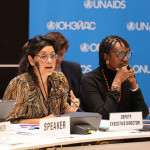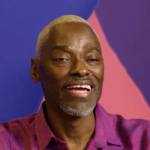Over the past year, a chorus of media headlines have captured the escalating backlash of antigay legislation and attacks against LGBTQ individuals in Uganda and other parts of Africa, while in the United States, some 600 antigay bills have been introduced this year alone. That’s why the discovery that a far greater majority of countries—indeed, two thirds of the world—have decriminalized same-sex sexuality comes as welcome news and rather a surprise. These nations have also reaped significant economic, health and social gains by doing so. As HIV activists have long argued, decriminalization is a weapon against HIV.
This good news comes from an October 2023 study of same-sex decriminalization in 194 countries and its impact on HIV targets titled Progress and the Peril: HIV and the Global De/criminalization of Same-Sex Sex. It shows that 129 of 194 countries surveyed do not criminalize same-sex sexuality. These include 13 countries that decriminalized homosexuality over the past five years and saw their pandemic-fighting capacity increase. In 2022 alone, four countries—Singapore, Barbados, St. Kitts and Nevis, and Antigua and Barbuda—decriminalized consensual same-sex sexuality. The current picture marks a remarkable reversal from the first days of AIDS, when most countries criminalized homosexuality.

2023 Policy Lab Report on DecriminalizationHIV Policy Lab
The study was carried out by the HIV Policy Lab (HIVPL) of the O’Neill Institute for National and Global Health at Georgetown University with the United Nations Development Programme and the Global Network of People Living with HIV and with data support from the Joint United Nations Programme on HIV/AIDS (UNAIDS), the U.S. President’s Emergency Plan for AIDS Relief and the International Lesbian, Gay, Bisexual, Trans, and Intersex Association.
“The reason why we’re talking about the decriminalization of LGBTQ people around the world is because it has a clear link to HIV outcomes,” said Matthew Kavanagh, PhD, director of the HIVPL. His team examined actual laws on the books and active prosecution. Notably, 24 countries with antigay laws practice a de facto policy of nonenforcement that represents a measure of progress, albeit insufficient. So long as homosexuality is criminalized, LGBTQ individuals will suffer discrimination. The authors back recommendations of the Global Commission on HIV and the Law to place an immediate moratorium on enforcement of laws criminalizing consensual same-sex sex, while advancing law reform.
Overall, the findings are a boon to global health policymakers and leaders, who view them as more evidence of how the AIDS epidemic can be ended. “Criminalizing laws alone increase HIV rates,” stated UNAIDS executive director Winnie Byanyima, commenting on the HIVPL report. “Two and a half years ago, member states of the United Nations boldly pledged to close the inequalities driving AIDS. This report shows the world can reach the 2025 goals to remove harmful laws.” Encouraged, she added, “We can end AIDS by 2030 if we address inequalities driving the pandemic, including those like criminalizing laws. This report shows us this is achievable.”
Conversely, criminalization is linked to regressive health and other outcomes. Currently, 41 countries report recent prosecution of homosexuality. They include Uganda, which recently passed the draconian Anti-Homosexuality Act (AHA). The AHA also makes it a crime to provide services to LGBTQ individuals or communities. Its passage has led to a violent backlash against LGBTQ individuals, including arrests, beatings and charges of torture linked to forced anal examinations against suspected homosexuals. Community clinics have closed, while health providers fear arrest and HIV clients stay home, too terrified to even go get medicine at a pharmacy. “It’s a nightmare,” confirms Frank Mugisha, a Ugandan activist from SMUG, a leading LGBTQ group fighting to repeal the AHA.
UNAIDS is among agencies tracking the backslide of HIV progress in Uganda and other countries where criminalization is linked to poorer health outcomes. The HIVPL report shows that men who have sex with men (MSM) had five times the odds of living with HIV in countries that criminalized homosexuality, compared with MSM in non-criminalizing contexts. That figure jumps up to 12 times higher odds in countries with recent prosecutions.
Reading the tea leaves, then, one can see where Uganda—or Chad or Brunei or Russia, among countries actively prosecuting homosexuality—are headed: toward poorer national HIV and health outcomes.
Although the report doesn’t delve deeply into the motivation behind criminalization, it does identify two common factors. One is colonial-era law, particularly British. A majority of the 41 countries that criminalize have antigay laws derived from 19th-century British penal codes. While Uganda’s President Yoweri Museveni and others denounce homosexuality as a modern Western import at odds with African culture, others denounce the laws as vestiges of colonialism. Mauritius’s Supreme Court recently voted to decriminalize, casting it as an act of decolonization.
“Some say this is a Western agenda. But no,” agrees Byanyima. “Look at this report: India, Botswana, Angola, Gabon, Barbados, Venezuela and just a few weeks ago, Mauritius. The [Global] South is moving.”
Politics is the other common factor underlying criminalization, including U.S. politics. It’s been widely reported that U.S. right-wing Christian evangelical groups, like Family Watch International, which is deemed a U.S. antigay hate group, have provided funding and legal training to antigay allies in Uganda to push passage of the AHA. They are doing this in other countries with pending or proposed antigay legislation, warned Kavanagh, calling it a well-financed, well-coordinated “neocolonial push.”
“We must not ignore the dangerous countertrend,” agreed Byanyina. “Those who are pushing in the opposite direction, toward deepening criminalization and harsher treatment of LGBTQ people, are on the wrong side of public health, the wrong side of economic growth and the wrong side of history.”
One way to convince them to reverse course is with evidence of the positive benefits of doing so. Here, the HIVPL is replete with facts, charts and data that make a strong case for the economic, social and health benefits of decriminalization. Homophobia and antigay laws cost the world more than $126 billion per year—much of it calculated in lost productivity and increased health costs.
The report highlights eight country case studies with different judicial and legislative approaches to successful decriminalization. It helps to have engaged LGBTQ activists and supportive groups in civil society and the legal sector. India’s experience also reveals that progress may not be linear. There, LGBTQ groups fought for two decades to repeal India’s colonial-era antigay penal code statutes. They won in 2004 and then saw the decision rolled back a year later, before securing a final victory in 2009, then lost an appeal in 2013, before a final Supreme Court ruling struck down the law in 2018. Recalling the ups and downs Vivek Divan, head of the Centre for Health Equity, Law and Policy and a member of the Lawyer’s Collective, stated, “It was very difficult, but India has shown that it can be done.”







Comments
Comments